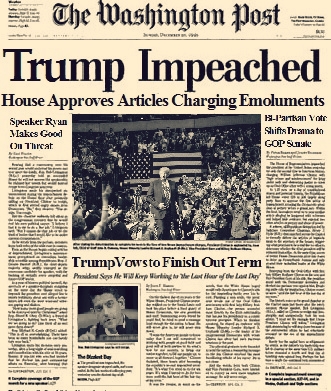Now that Tr-mp’s chief of staff, John Kelly, has outed himself as a card-carrying Tr-mper, we can move on with the job of trying to save our democracy ourselves. We’re not going to get any help from a man who is either as confused as he can be about the Civil War, slavery, and Robert E. Lee, or is just a tie-wearing white supremacist in the White’s House. You decide.
First of all, Kelly gave an interview, a very rare one for him, on Monday evening to Fox’s Laura Ingraham, trying, no doubt, to boost not only Tr-mp’s sinking ratings, but also the ratings for Ingraham’s brand new show, unashamedly a Tr-mp propaganda platform that Fox specializes in. Ingraham is a cross between Ann Coulter and Sean Hannity, which is why she has been a thang in the conservative media complex for years now. So, Kelly appearing on her show and only on her show is all we really need to know about him, in terms of hoping he would bring some sanity to the White’s House—at one point he used the it-polls-well phrase, “agents of the swamp,” to describe opponents. But there is more, much more, to know about him (go here for some of his past behavior).
Kelly, of course, recently lied about congresswoman Frederica Wilson, who just happens to be black. He absolutely lied about her when he was trying to defend Tr-mp’s call to the widow of a fallen soldier, who also happens to be a black woman. The fact that he lied through all that is not up for debate. Yet last night Ingraham asked him about the matter and about whether the thought he had something to apologize for. This is how that ended:
KELLY: Oh, no. No. Never. Well, I’ll apologize if I need to. But for something like that, absolutely not. I stand by my comments.
INGRAHAM: Washington —
KELLY: But I’d just as soon let that go.
He stands by his lie, and the arrogant way he said he wouldn’t apologize was stunning. He stands by the lie just like he stands by Tr-mp, who is a lie incarnated in an orange skinsuit. For Kelly, a black congresswoman apparently has no rights that a white man in the White’s House is bound to respect. Period. But, being a white gentleman who claimed he’d heard “screams out of the graves” at Arlington before he lied about the congresswoman, said he’d “just as soon let that go.” Thus, the interview moved on to the Civil War and another lie, or three.
In the context of some well-meaning folks planning on removing plaques honoring George Washington and Robert E. Lee from their historic church in Alexandria, Virginia—just why the hell were those plaques there anyway?—Ingraham asked Kelly:
INGRAHAM: What is your reaction to that type of attempt to pull down little markers of history?
KELLY: Well, history’s history. And, uh, there are certain things in history that were not so good and other things that were very, very good. I think we make a mistake, though, as a society and certainly as individuals, when we take what is today accepted as right and wrong and go back 100, 200, 300 years or more and say what those people— what Christopher Columbus did was wrong, you know, 500 years later. Uh, it’s inconceivable to me that you would take what we think now and apply it back then…I think it’s just very, very dangerous, and it shows you, uh, how much of a lack of appreciation of history and what history is.
I will tell you that Robert E. Lee was an honorable man. He was a man that gave up his country to fight for his state, which 150 years ago was more important than country. It was always loyalty to state first back in those days. Now it’s different today. But the lack of ability to compromise led to the Civil War. And men and women of good faith on both sides made their stand where their conscience had them make their stand.
Everything Kelly said was wrong, except for maybe the fact that history really is history. And sometimes I’m not even sure about that anymore. But in any case, let’s start with what he said regarding the way we look back at history. He said it was “inconceivable”—definition: “not capable of being imagined or grasped mentally”—to him that “you would take what we think now and apply it back then.” Huh? I nconceivable? Really? He can’t imagine how folks living today might look back at, say, slavery and decide, “Hey, that was wrong”? Kelly can’t mentally grasp that? Well, of course he can grasp that. He just doesn’t want to grasp it, for whatever reason. Nobody (well, almost nobody) condones the so-called “Final Solution to the Jewish Question” by going back and applying a unique set of moral standards to post-WWI Germans. There were people alive at the time and living in Germany who knew it was absolutely wrong to target Jews, just as there were people living in colonial and post-colonial America who knew that it was wrong to enslave other people. And even if they didn’t, we do. And we have every right to look back and emphatically say of our ancestors, “You were wrong.” And we certainly have the right to not honor them with plaques and monuments.
nconceivable? Really? He can’t imagine how folks living today might look back at, say, slavery and decide, “Hey, that was wrong”? Kelly can’t mentally grasp that? Well, of course he can grasp that. He just doesn’t want to grasp it, for whatever reason. Nobody (well, almost nobody) condones the so-called “Final Solution to the Jewish Question” by going back and applying a unique set of moral standards to post-WWI Germans. There were people alive at the time and living in Germany who knew it was absolutely wrong to target Jews, just as there were people living in colonial and post-colonial America who knew that it was wrong to enslave other people. And even if they didn’t, we do. And we have every right to look back and emphatically say of our ancestors, “You were wrong.” And we certainly have the right to not honor them with plaques and monuments.
Next we have the obnoxious “Robert E. Lee was an honorable man” claim based on what Kelly said about Lee giving “up his country to fight for his state” because states were “more important than country” in Lee’s day. My, oh, my. Where did Kelly go to school? Where did he get such nonsense? I’ll let Columbia University history professor Stephanie McCurry explain where it might have come from:
That statement could have been given by [former Confederate general] Jubal Early in 1880. What’s so strange about this statement is how closely it tracks or resembles the view of the Civil War that the South had finally got the nation to embrace by the early 20th century. It’s the Jim Crow version of the causes of the Civil War. I mean, it tracks all of the major talking points of this pro-Confederate view of the Civil War.
Robert E. Lee was a traitor, as I have written before. He wasn’t merely fighting for the state of Virginia. He was fighting for the Confederacy, which made itself the enemy of the United States. That’s not even in doubt. The fact that Kelly tried to muddy the waters is evidence that he has a strong sympathy for “the Jim Crow version of the causes of the Civil War.” Or it is evidence that he is playing Nixon’s Southern Strategy political game. Or both.
As for Kelly’s breathtakingly weird claim that “the lack of ability to compromise led to the Civil War,” another historian, Yale professor David Blight, said:
This is profound ignorance, that’s what one has to say first, at least of pretty basic things about the American historical narrative. I mean, it’s one thing to hear it from Trump who, let’s be honest, just really doesn’t know any history and has demonstrated it over and over and over. But General Kelly has a long history in the American military…Any serious person who knows anything about this can look at the late 1850s and then the secession crisis and know that they tried all kind of compromise measures during the secession winter, and nothing worked. Nothing was viable.
Abraham Lincoln tried, up to the last minute, everything he could think of to prevent the war. You don’t even have to be a professor at Columbia or Yale to know that. Just read Lincoln’s first inaugural address, which I will quote at length:
Apprehension seems to exist among the people of the Southern States that by the accession of a Republican Administration their property and their peace and personal security are to be endangered. There has never been any reasonable cause for such apprehension. Indeed, the most ample evidence to the contrary has all the while existed and been open to their inspection. It is found in nearly all the published speeches of him who now addresses you. I do but quote from one of those speeches when I declare that—
I have no purpose, directly or indirectly, to interfere with the institution of slavery in the States where it exists. I believe I have no lawful right to do so, and I have no inclination to do so.
Those who nominated and elected me did so with full knowledge that I had made this and many similar declarations and had never recanted them; and more than this, they placed in the platform for my acceptance, and as a law to themselves and to me, the clear and emphatic resolution which I now read:
Resolved, That the maintenance inviolate of the rights of the States, and especially the right of each State to order and control its own domestic institutions according to its own judgment exclusively, is essential to that balance of power on which the perfection and endurance of our political fabric depend; and we denounce the lawless invasion by armed force of the soil of any State or Territory, no matter what pretext, as among the gravest of crimes.
I now reiterate these sentiments, and in doing so I only press upon the public attention the most conclusive evidence of which the case is susceptible that the property, peace, and security of no section are to be in any wise endangered by the now incoming Administration.
I remind you those words were offered in March of 1861. Five weeks later Confederate General P.G.T. Beauregard opened fire on Fort Sumter in South Carolina and the treacherous war against the United States was on. Compromise simply wasn’t possible with white people who thought they had a God-given right to enslave black people. As Professor McCurry put it:
In 1861, compromise wasn’t possible because some southerners just wanted out. They wanted a separate nation where they could protect slavery into the indefinite future. That’s what they said when they seceded. That’s what they said in their constitution when they wrote one.
So, we have to decide what it is that motivated Kelly—who was born into an Irish Catholic family in Boston—not only to arrogantly refuse to apologize to an African-American congresswoman he lied about, but what motivated him to offer a version of our history that is a knife in the heart of any chance of a lasting racial reconciliation. About that white-centric version of history, Professor Blight said:
It’s just so absurd. It’s just so sad. It’s just so disappointing that generations of history have been written to explode all of this and yet millions of people — serious people; experienced, serious people and now people with tremendous power — have grown up believing all this.
It is absurd. It is sad. It is disappointing. Just like Tr-mp.













